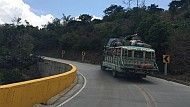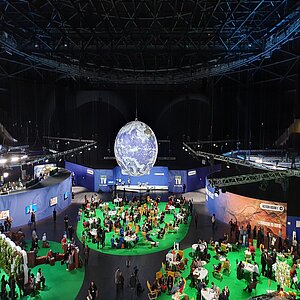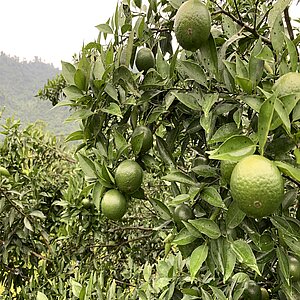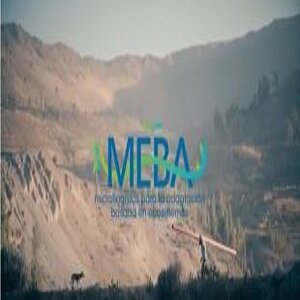Climate-intelligent agriculture engagement by the IKI

After the oceans, soils are the second-largest carbon reservoirs in the world. This means that climate-intelligent land use is essential. This is why the IKI funds projects all over the world that promote low-emission agriculture and help agricultural production adapt to the consequences of climate change.
Global land use is responsible for almost 25% of greenhouse gases. The main culprit here is agriculture, but forestry and the deforestation of land for other purposes also make a significant contribution. Soils and vegetation, however, also absorb almost 30% of human-made greenhouse gas emissions.
These statistics from the “Climate Change and Land”, a special report published by the Intergovernmental Panel on Climate Change (IPCC) in October 2019 clearly shows that the way we manage our soils is a vital in climate change (both positively or negatively). This applies even more since the consequences of climate change, such as extreme weather events, have a direct impact on agriculture and thus on food security.
The International Climate Initiative (IKI) therefore promotes climate-friendly agriculture in numerous activities and attaches great importance to supporting its partner countries, also in adapting to the consequences of climate change and protecting biodiversity in the agricultural sector.
New fund with IKI resources promotes climate protection in agriculture
A new fund, the “Support Programme on Scaling up Ambition on Land Use and Agriculture through NDCs and NAPs implementation“, was recently launched by the Federal Ministry for the Environment, Nature Conservation and Nuclear Safety (BMU), United Nations Development Programme (UNDP) and the Food and Agriculture Organization (FAO) at the margins of the World Climate Conference in Madrid. This fund will support up to twelve developing countries in the implementation of their national goals regarding important agricultural value chains and land use. The funding, which comes from IKI resources amounts to EUR20 and has a planned duration of 2020 to 2025.

“So far, land use and agriculture have hardly received any attention in the international climate debate. After the oceans, soils store the second largest amounts of carbon in the world, but overuse and erosion release large amounts of CO2. In addition to this, adaptation to climate change poses ever greater challenges for agriculture, particularly in developing countries, which place high priorities on food security and income from agriculture. However, agriculture is also a major emitter of greenhouse gases. These are the issues which we now intend to tackle together with our partner countries”, says Svenja Schulze, Minster of Environment.
Reduction of greenhouse gas emissions from agriculture
In addition to this new measure, many IKI projects are addressing the various effects of agricultural land use and developing approaches to solutions. One example is the project “Taking Land Use Change Out Of Commodity Production In Savannahs And Grasslands Through Policy Engagement, Land Use Planning And Best Management Practices” which is implemented by the WWF. Among other approaches, this project carries out pilot projects in Colombia and Paraguay to demonstrate climate-friendly and biodiversity-friendly agriculture. The project uses this experience to develop and improve ways of contributing to sustainable land use and reducing greenhouse gas emissions from agriculture.

Adaptation of agriculture to climate change
In addition to the reduction of greenhouse gases from agriculture, the IKI is also focusing on the adaptation of this sector to the consequences of climate change. For example, the project “Microfinance for ecosystem-based adaptation (MEbA)” funds the development and dissemination of microfinance products such as small loans, which are used in the project regions of Latin America and Africa for adaptation to climate change. Above all, this concept helps smallholders, who are particularly affected by the lack of climate financing at local levels.
On the other hand, the project “Applying Seasonal Climate Forecasting and Innovative Insurance Solutions to Climate Risk Management in the Agriculture Sector in Southeast Asia” develops climate risk management systems and insurance products for coffee, sugar, rice, cassava cultivation and pasture management. The intention here is to provide funding for both specific damages caused by climate change and its financial consequences. The project also supports ministries in Cambodia, Laos, Myanmar and Vietnam in the development of adaptation and risk strategies, such as the preparation of seasonal climate forecasts.

Biodiversity in agriculture
However, the reduction of greenhouse gases and adaptation to the consequences of climate change are not the only priorities of the IKI – the protection of biological diversity is also a focal point, and this is why the IKI finances many projects that promote the protection of biodiversity in agriculture. For example, the project “Scaling Up the Conservation Of Biodiversity Through Climate Smart Agro-Silvopastoral Practices in Landscapes Dominated by Cattle-Raising Systems in the Tropical Regions of Mexico (“Biopasos”)” in Mexico funds approaches that combine trees, arable crops and animal husbandry into holistic systems. These “agro-silvopastoral” systems increase agricultural productivity and the incomes of agricultural stakeholders, improve the protection of biodiversity and reduce vulnerability to the effects of climate change.
IKI project at the Green Week in Berlin
The Kaffee-Kooperative.de (coffee cooperative) will ensure sustainable coffee enjoyment at the Green Week in Berlin, which starts on 17 January 2020. Co-founder Allan Mubiro is a graduate of the IKI project “Scholarship Programme for Young Management Professionals from Developing and Emerging Countries in the Field of Climate and Resource Protection”. This social business start-up in Berlin imports and sells Fairtrade coffee from Rwanda, the entire production chain of which remains in the African country. The coffee is cultivated on a non-industrial scale and is grown in mixed cultivation with other crops and very often under shady trees.
Even more projects on the IKI Worldmap
The projects presented here represent only part of the IKI funding for land use. Agriculture, a critical sector of many emerging and developing countries, is often connected to many other aspects of IKI funding. An overview of all current and completed projects can be found on the IKI World Map.
The link has been copied to the clipboard
Contact
IKI Office
Zukunft – Umwelt – Gesellschaft (ZUG) gGmbH
Stresemannstraße 69-71
10963 Berlin
Related Videos
Related Publications
-
 08/ 2022 | IKI Evaluation
08/ 2022 | IKI EvaluationMicrofinance for Ecosystem-Based Adaptation (MEbA)
[Translate to English:] Deutsch (PDF, 864 KB)












